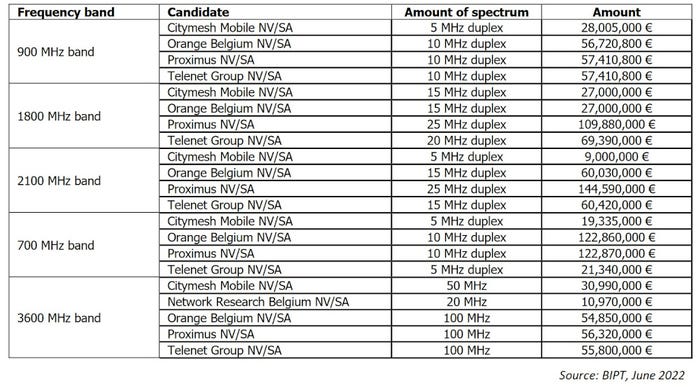Belgium spends €1.2 billion on long-awaited 5G auctionBelgium spends €1.2 billion on long-awaited 5G auction
After years spent grappling with mobile radiation limits, Belgium has finally completed its first 5G spectrum auction.
June 21, 2022

After years spent grappling with mobile radiation limits, Belgium has finally completed its first 5G spectrum auction.
In total, 50 MHz of 700-MHz spectrum, and 370 MHz of 3600-MHz spectrum – both specifically for 5G – went under the hammer courtesy of the Belgian Institute for Post and Telecommunications (BIPT). The regulator also re-auctioned frequencies in the 900 MHz, 1800 MHz and 2100 MHz bands to support the continuation of 2G, 3G and 4G services.
The multi-band auction raised a total of €1.2 billion for the Belgian state, and promises to shake up the mobile market thanks to the participation of two new entrants, which will increase the number of MNOs to five.
One of the newcomers is Citymesh, which until now has operated localised private 4G and 5G services in its own, limited spectrum, while relying on an MVNO deal with incumbent telco Proximus for nationwide 4G coverage. Back in March, ahead of the auction, Citymesh exercised an €83.34 million option to acquire 30 MHz of reserved paired spectrum divvied up between the 700 MHz, 900 MHz, 1800 MHz, and 2100 MHz bands. It has now added to this portfolio, bidding €30.99 million during the auction for 50 MHz of unpaired 3600-MHz spectrum.
In a statement on Tuesday, Citymesh said it will form a joint venture with its parent company, Romania-based Digi Communications, which will share the cost of building a new nationwide 4G/5G network. The JV will offer services from both of its parents’ respective brands: Citymesh will focus on the B2B market, and Digi will address the B2C market.
“Our goal is to build the best, highest performing 4G/5G network in the country,” said Citymesh CEO Mitch De Geest. “Because we start from a blank sheet, we have the opportunity to take advantage of the technological advances of 5G from the start and can optimally plan the rollout.”
The other newcomer is ICT provider and systems integrator Network Research Belgium (NRB), which stumped up €10.97 million for 20 MHz of 3600-MHz spectrum. It will focus solely on corporate customers, leaving the others to fight over the consumer market.
“NRB is not going to start selling subscriptions to individuals. Our business is B2B and this is [the] purpose for which we will use the frequencies obtained,” said a statement from NRB chief executive Pascal Laffineur. “We know that 5G will very quickly become an essential condition for competitiveness and efficiency of companies and public services. It was therefore crucial for our customers to be able to count on a local player, who knows them well, to immediately embark on this new stage of the digital revolution.”
NRB plans to open a 5G innovation lab on Friday, where its team will design new 5G use cases and applications for several verticals, including utilities, logistics, hospitals, smart cities, and public services. Citymesh/Digi and NRB will have their work cut out though, given they will face off against well-entrenched competitors in the form of Orange, Proximus and Telenet, all of which picked up spectrum during the auction including, of course, 5G spectrum.
Proximus was the biggest spender, bidding €491 million for spectrum in all five available bands. In terms of 5G, it spent €122.87 million on 2×10 MHz of 700-MHz spectrum, and €56.32 million on 100 MHz of 3600-MHz spectrum.
“The newly acquired spectrum in the 700 and 3600 MHz band will finally make it possible to bring the benefits of 5G to the entire Belgian population. As far as the implementation of 5G technology is concerned, it’s safe to say that we have been a frontrunner so far, and we are very eager to leverage the full potential of 5G,” said Proximus CEO Guillaume Boutin, in a statement.
Orange Belgium is also pleased with itself, having spent €321.46 million across all five bands, picking up the same quantity of 5G spectrum as Proximus.
“The spectrum obtained will allow us to implement our 5G ambitions and deploy innovative and future technologies to continue providing the best experience to our customers in an efficient and sustainable way,” said Xavier Pichon, CEO of Orange Belgium.
Orange Belgium also announced plans to begin phasing out 3G from mid-2023 with a view to completing the shutdown by 2025.
“By phasing out 3G technology we are getting rid of obsolete equipment that consumes a lot of electricity, space and human energy to maintain,” said Orange Belgium’s chief network officer Stefan Slavnicu. “3G data represents today less than 2 percent of the total data traffic on the network. With this move, we will have networks that are software-based, resilient and automated, ready for future evolutions.”
Meanwhile, Telenet also picked up spectrum in all available frequency bands, spending €264.3 million in total. Like its peers Orange and Proximus, Telenet also secured 100 MHz of 3600-MHz spectrum. However, it acquired just 2×5 MHz of 700-MHz spectrum.
The 5G auction has been a long time coming due to Belgium’s well-documented reticence over easing mobile radiation rules. Now, having completed its first 5G auction, the BIPT is already planning its second. Indeed, once the dust settles on the allotment phase of this multi-band auction, a bunch of 5G frequencies in the 1400 MHz band are due to go under the hammer. It seems that in Belgium you wait years for a 5G spectrum auction, and then two come along at once.
Here are the full tallies.

Get the latest news straight to your inbox. Register for the Telecoms.com newsletter here.
About the Author
You May Also Like










.png?width=300&auto=webp&quality=80&disable=upscale)


_1.jpg?width=300&auto=webp&quality=80&disable=upscale)